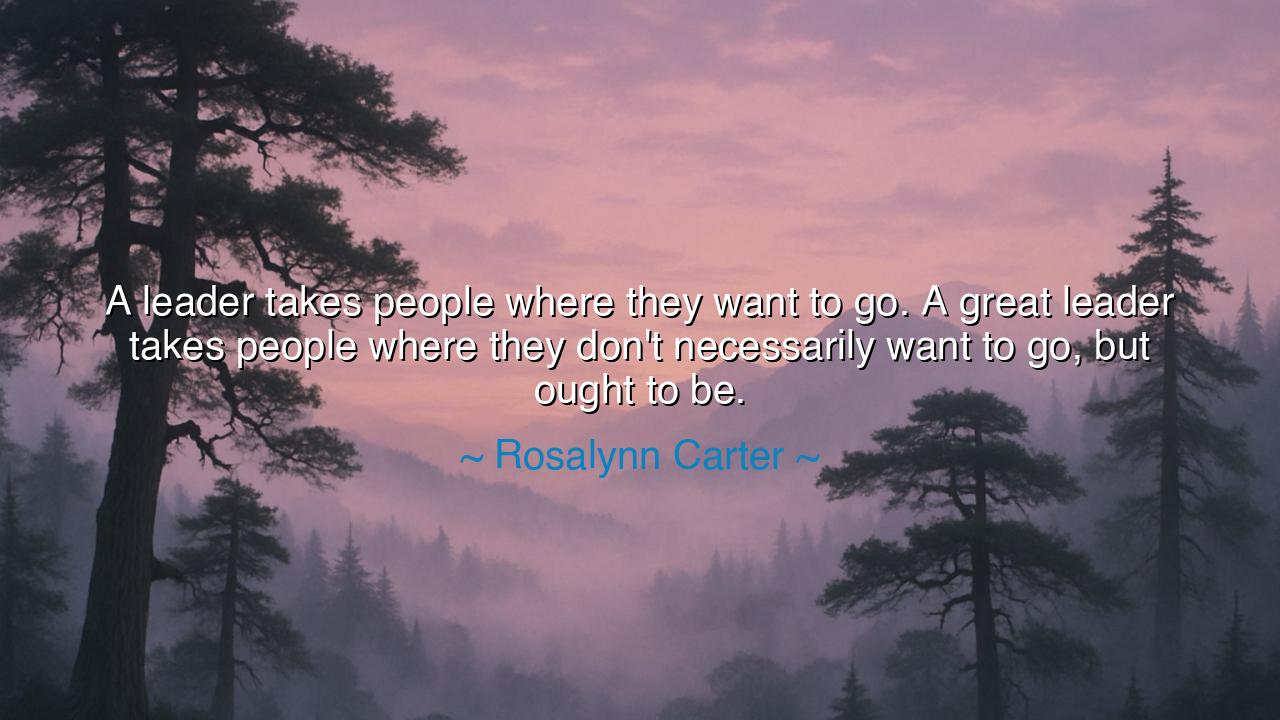
A leader takes people where they want to go. A great leader takes
A leader takes people where they want to go. A great leader takes people where they don't necessarily want to go, but ought to be.






The words of Rosalynn Carter — “A leader takes people where they want to go. A great leader takes people where they don’t necessarily want to go, but ought to be” — shine like a torch held high against the darkness of complacency. In these few lines, Carter, the steadfast partner of a U.S. president and a leader in her own right, distills the essence of true leadership — not as the pursuit of popularity, but as the courage to guide others toward growth, truth, and the greater good, even when the path is steep and unwelcome. Her wisdom echoes the voice of the ancients who taught that greatness is not born of comfort, but of conviction.
Rosalynn Carter spoke these words not as a theorist, but as one who had walked beside power, service, and sacrifice. Her life was intertwined with that of her husband, President Jimmy Carter, through seasons of triumph and trial. Together they led not only from the podium but from the heart — building homes for the poor, defending peace, and fighting disease long after their time in office. From her experience, she saw that the difference between a leader and a great leader lies in vision: a true leader sees not only the desires of the people, but their potential — what they could become if only someone dared to challenge their limits.
The origin of this quote rests in the ancient understanding of moral duty. In every age, humanity has hungered for leaders who flatter their desires, who promise ease and pleasure. Yet, as the philosophers knew, such leaders are not shepherds but merchants of illusion. The great ones — like Moses, who led his people not into comfort but through wilderness; or Socrates, who forced Athens to question its own ignorance — are those who bear the burden of truth. They do not lead for praise, but for purpose. They lead not by giving the people what they want, but by guiding them to what they need.
Consider the example of Winston Churchill, whose leadership during the Second World War embodies Carter’s words. When Britain stood alone against tyranny, many longed for peace, even at the cost of freedom. Churchill, however, refused the seduction of the easy path. He led his people not to safety, but through danger; not to comfort, but to courage. His words, “I have nothing to offer but blood, toil, tears, and sweat,” were not what the nation wanted to hear — yet they were what the nation needed. In leading them toward endurance rather than surrender, he proved that greatness is not the art of pleasing, but the art of transforming.
And so it has been through all the ages. Joan of Arc, though a simple girl, led armies to victory because she saw beyond fear to faith. Abraham Lincoln carried a divided nation through war and sorrow, enduring hatred and isolation because he believed in a union healed by justice. Such leaders are pain-bearers, walking ahead into the storm so that others may follow into light. They are not always loved in their time, but history bends toward their courage.
Carter’s words also teach a lesson for the soul, for each of us is a leader — of a family, a friendship, a vision, or even of our own conscience. To lead oneself well is to guide one’s own heart where it “ought to be,” even when it resists. It means choosing truth over comfort, integrity over applause, discipline over indulgence. In this way, her wisdom reaches beyond politics and power — it becomes a mirror, calling every listener to ask: Am I leading my life toward ease, or toward greatness?
Let this, then, be the lesson carried forward: to lead with love, but not with fear of disapproval. To listen to the people’s cries, yet never let them drown out conscience. The great leader must sometimes walk alone, misunderstood, bearing the weight of a vision too large for the moment. But in the end, such courage lifts the world. As Rosalynn Carter reminds us, to lead truly is not to serve desire, but to awaken destiny.
So, when your time comes to guide — whether one soul or a thousand — remember her words. Take them not where they wish to go, but where they must. Lead not for comfort, but for truth. And when the journey grows dark and lonely, take heart: for the path of the great has always begun where others refused to walk.






AAdministratorAdministrator
Welcome, honored guests. Please leave a comment, we will respond soon